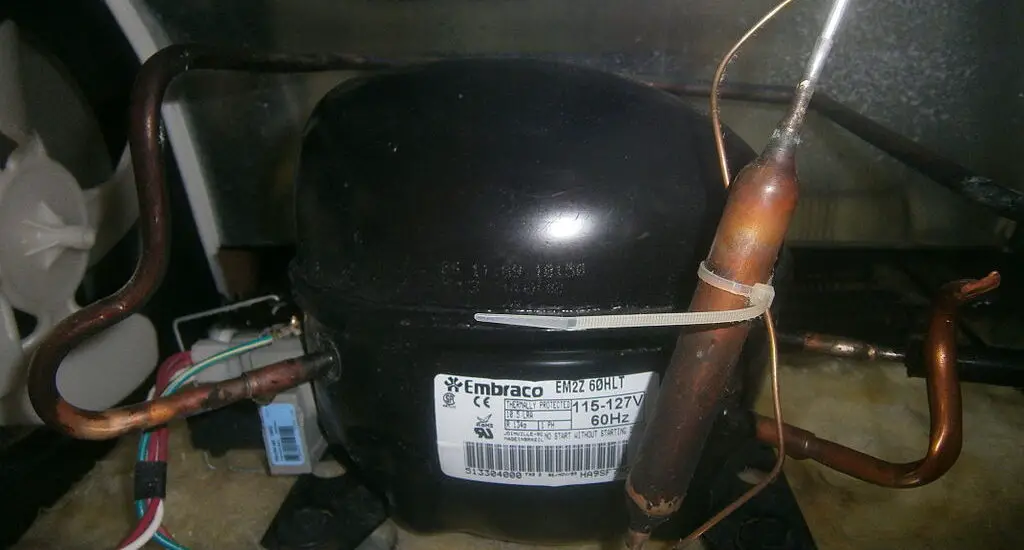Ah, the humble fridge compressor, the heartbeat of your fridge. Without it, your fridge is just an oversized lunchbox. You’re here because you’re keen to learn how to start a fridge compressor, right? Buckle up, because we’re about to journey into the cool depths of your refrigerator, shedding light on its frosty secrets.

Table of Contents
Brief Overview of How to Start a Fridge Compressor
Starting a fridge compressor isn’t as tough as it seems. In fact, it’s pretty much a straightforward process, involving a series of systematic steps from safety measures, locating the compressor, and getting it up and running. But hold on, why do we even need a compressor in a fridge?
Understanding the Role of a Compressor in Your Fridge
A fridge without a compressor? No way! That’s like a car without an engine. The compressor is the powerhouse of your fridge, playing a critical role in the cooling process. It compresses the refrigerant, which is then released through the coils in the fridge, absorbing heat and making your food stay fresh and cool.
How a Fridge Compressor Works
Did you know that your fridge compressor is basically a vapor pump? It takes in low-pressure, low-temperature refrigerant gas, and spits out high-pressure, high-temperature gas. As the high-pressure gas cools down, it turns into a liquid, which then evaporates back into a gas inside your fridge, absorbing the heat in the process. Neat, right?
Recognizing When Your Fridge Compressor Needs Starting
Okay, so you know what a fridge compressor does, but how do you know when it needs a jumpstart? There are a couple of tell-tale signs to watch out for. Let’s uncover them, shall we?
Common Symptoms of a Non-Functioning Fridge Compressor
Is your fridge starting to feel like a closet rather than a cool haven for your food? This could be a sign that your compressor needs a start. Another hint is if your fridge is making more noise than usual. That’s the compressor crying out for some attention!
Safety Measures Before Starting a Fridge Compressor
Before we get down to business, remember safety first. We’re dealing with electricity here, and it doesn’t play nice when disrespected.
Disconnecting Power
Step one: disconnect the fridge from the power source. It might seem like a no-brainer, but you’d be surprised at how easy it is to forget this crucial step when you’re eager to get started.
Using Appropriate Protective Equipment
Put on safety glasses and gloves. We’re not prepping for a fashion show here, but safety goggles and gloves can be a real lifesaver when dealing with electrical components.
Check out these other related articles…
Fridge Compressor Fitting: In 5 Easy Steps
12V Compressor Fridge: The Comprehensive Guide
Fridge Compressor Rate: Your Ultimate 411 Guide
2-Way Compressor Fridge: Your Comprehensive Guide
Compressor Fridge for Campervan: Your Basic 101 Guide
Bad Smell from Fridge Compressor: Causes & Proven Remedies
Does a Compressor Fridge Need Ventilation? [Detailed Answer]
Step-By-Step Guide on How to Start a Fridge Compressor
Alright, safety gear on? Power disconnected? Good! Now, let’s delve into the step-by-step guide on how to start a fridge compressor.
Locating and Accessing the Compressor
Your fridge compressor isn’t hiding, but it’s usually tucked away at the back or bottom of the fridge. You might need to remove a cover panel to get to it.
Checking the Compressor for Any Visible Issues
Give the compressor a good look over. If you notice any obvious issues like frayed wires or leaks, you might need to call in a professional.
Reconnecting the Power and Starting the Compressor
Now the moment of truth. Connect the fridge back to the power source, turn it on, and listen for the hum of the compressor. If all goes well, you’ve just successfully started a fridge compressor. If not, don’t sweat it, we’ve got a plan B.
Potential Problems and Their Solutions
Things don’t always go as planned but don’t worry, we’re here to help. Here are some common issues you might face and how to deal with them.
What to Do if the Compressor Doesn’t Start
If your compressor doesn’t start, you might be dealing with a faulty start relay, which is a device that sends power to the compressor. You’ll need to replace this part, which you can easily order online or pick up at a local appliance parts store.
When to Call a Professional
When in doubt, call a pro. If your compressor isn’t starting and you’ve tried everything, it might be time to bring in an expert. After all, a fridge isn’t much use without a working compressor, right?